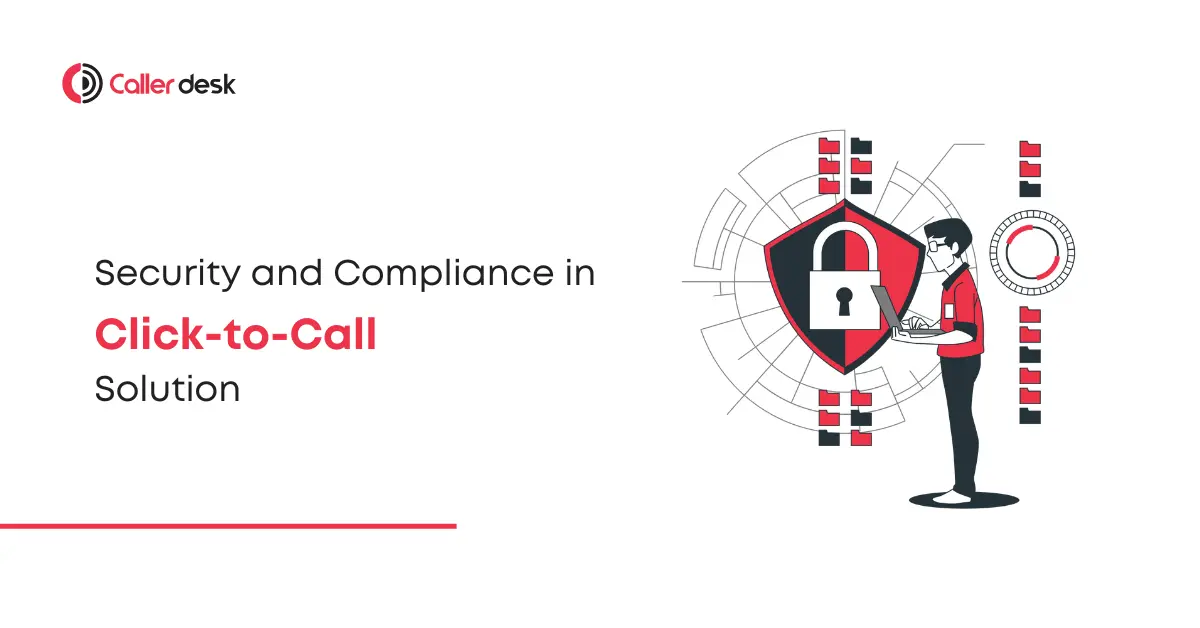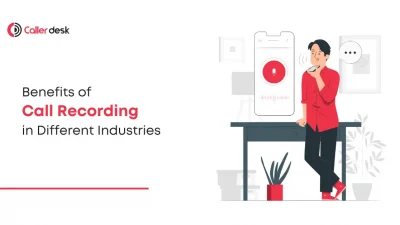Click-to-call technology has emerged as a game-changer for businesses in India and across the globe. By allowing customers to instantly connect with businesses through a single click on a website or mobile app, it streamlines communication, enhances convenience, and delivers faster responses. The result? Happier customers and improved satisfaction rates.
However, with great convenience comes the responsibility of ensuring data security and compliance with regulations. Click-to-call systems handle sensitive customer information such as phone numbers, call logs, and recorded conversations. Without robust security measures, this data is vulnerable to breaches, exposing businesses to reputational and legal risks.
This article takes a deep dive into the importance of security and compliance in click-to-call solutions, outlining potential risks, critical regulations, and actionable strategies to safeguard your systems.
What Are Click-to-Call Solutions?
Click-to-call solutions are software tools that allow users to initiate a phone call directly by clicking a button on a website, mobile app, or digital platform. Widely adopted by businesses for customer support, sales, and inquiries, these solutions eliminate the hassle of manually dialing numbers, making interactions faster and more seamless.
Benefits of Click-to-Call
- Ease of Use: Customers can connect with businesses instantly without navigating complex menus or forms.
- Improved Accessibility: Click-to-call bridges the communication gap between businesses and their audience, ensuring no query goes unanswered.
- Faster Resolutions: Customers receive real-time responses, enhancing satisfaction and trust.
Example Use Cases
- E-commerce: Customers can inquire about product details or track orders directly from the website.
- Healthcare: Patients can schedule appointments or consult with doctors in emergencies.
- Real Estate: Potential buyers can connect with agents instantly to discuss property listings.
While click-to-call solutions revolutionise customer interactions, their success depends on securing the underlying infrastructure and ensuring compliance with local and global regulations.
Why Security Is Critical in Click-to-Call Systems
Click-to-call solutions process large volumes of sensitive data, making them a prime target for cybercriminals. Here’s why security is paramount:
1. Protecting Customer Data
Customer data is at the heart of every click-to-call interaction. This includes:
- Phone Numbers: The primary identifier in every call.
- Call Logs: Information about when and where the call was made.
- Recordings: Conversations that may include confidential details such as financial data or medical histories.
A breach of this data can result in:
- Loss of trust among customers.
- Reputational damage to the business.
- Financial penalties for non-compliance with regulations.
2. Rising Cyber Threats
With cyberattacks becoming increasingly sophisticated, click-to-call systems face the following risks:
1. Call Interception
Hackers may intercept calls, gaining access to confidential customer-business conversations.
2. VoIP Vulnerabilities
Click-to-call often relies on Voice over Internet Protocol (VoIP), which can be exploited through phishing, malware, or denial-of-service (DoS) attacks.
3. Unauthorized Access
Weak authentication systems can allow attackers to exploit vulnerabilities, leading to service disruptions and data leaks.
Key Regulations Businesses Must Follow
To mitigate risks and ensure data integrity, businesses must adhere to several regulatory standards. Key frameworks include:
1. IT Act, 2000 (India)
The Information Technology Act, 2000, mandates businesses in India to implement reasonable security practices for handling sensitive personal data. It is one of the foundational laws governing cybersecurity and data protection in the country.
2. GDPR (Global)
The General Data Protection Regulation applies to businesses handling the data of EU citizens. It emphasises:
- Obtaining explicit customer consent for data usage.
- Ensuring secure storage and transmission of customer information.
3. CCPA (California)
The California Consumer Privacy Act empowers customers to control their data. Businesses must:
- Provide transparency about data collection practices.
- Allow customers to opt-out of data sharing.
4. PCI DSS
The Payment Card Industry Data Security Standard governs businesses handling payment-related information. It requires encrypted communication and secure storage for financial transactions.
Failure to comply with these regulations can result in significant legal and financial penalties.
Essential Security Measures for Click-to-Call Solutions
To protect sensitive customer information and ensure compliance, businesses must implement the following measures:
1. End-to-End Encryption
Encrypting call data ensures that information remains secure during transmission, preventing unauthorized interception by hackers.
2. Strong Authentication Mechanisms
Use multi-factor authentication (MFA) to verify user identities and restrict unauthorized access to your system.
3. Regular Security Audits
Conduct regular penetration testing and vulnerability assessments to identify potential weaknesses in your system. Address these vulnerabilities promptly to avoid exploitation.
4. Data Anonymization
Mask sensitive information, such as phone numbers and call logs, in your databases. This minimizes exposure in the event of a breach.
5. Compliance-Certified Platforms
Partner with platforms that offer built-in compliance features such as:
- Consent tracking.
- Encrypted storage for call logs.
- Automated audit trails for regulatory reporting.
How to Choose the Right Click-to-Call Solution for Indian Businesses
When selecting a click-to-call solution, consider the following factors:
1. Advanced Security Features
ecurity is non-negotiable when dealing with sensitive customer data and communications. Look for solutions that prioritize:
- End-to-End Encryption: Ensure all calls are protected from unauthorized access.
- Real-Time Threat Monitoring: Detect and mitigate security risks instantly.
- Strong Authentication: Use tools like Multi-Factor Authentication (MFA) to secure user accounts.
2. Compliance with Local and Global Laws
A reliable Click-to-Call solution must adhere to legal requirements to avoid fines and reputational damage. Key regulations include:
- The IT Act, 2000 (India): Ensures legal compliance for data security and electronic communication in India.
- GDPR (Global): Protects customer data privacy, essential for businesses with international operations.
- PCI DSS (Global): Vital for companies handling payment information.
3. Scalability and Integration
As your business grows, your communication tools must adapt and integrate with existing systems. Look for:
- Scalability: The ability to handle an increasing volume of calls as your business expands.
- CRM Integration: Sync with platforms like Salesforce or HubSpot for streamlined customer management.
- Customer Support Tools: Compatibility with tools like Zendesk or Freshdesk for efficient support.
- Analytics Platforms: Integration with data tools for actionable insights into call performance and customer behavior.
Additional Tips for Indian Businesses:
- Local Language Support: Ensure the system supports multiple Indian languages to cater to diverse customer bases.
- Cost Efficiency: Evaluate solutions offering affordable pricing plans for startups and small businesses.
- Mobile Compatibility: Opt for tools that work seamlessly on mobile devices, essential in a mobile-first market like India.
By prioritizing these factors, you can choose a Click-to-Call solution tailored to your business needs, ensuring secure, compliant, and efficient communication that supports growth and customer satisfaction.
Conclusion
Click-to-call solutions offer businesses unparalleled convenience and enhanced customer engagement. However, their success hinges on robust security measures and strict adherence to data protection regulations.
By implementing best practices—such as encryption, authentication, and regular audits—and partnering with compliance-certified platforms, businesses can protect sensitive information, build trust, and ensure long-term success.
Remember, prioritising security and compliance is not just a technical necessity; it’s an investment in your brand’s reputation and customer loyalty.
Frequently asked questions
1. Why is security important in click-to-call solutions?
Security protects sensitive customer data like phone numbers and call recordings, ensuring customer trust and preventing data breaches.
2. What are the risks of ignoring compliance?
Non-compliance can lead to:
Heavy fines.
Legal disputes.
Loss of customer trust and reputational damage.
3. How does encryption improve click-to-call security?
Encryption ensures that data transmitted during calls remains confidential and inaccessible to unauthorized parties.
4. Can compliance-certified platforms simplify adherence to regulations?
Yes, compliance-certified platforms come with built-in features like consent tracking and encrypted storage, making it easier to meet legal requirements.
5. How do regular security audits help?
Audits identify vulnerabilities in your system, allowing businesses to address issues proactively and avoid exploitation.





